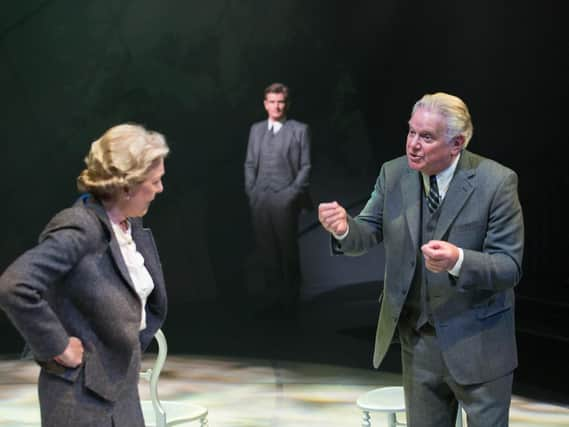REVIEW: Copenhagen, Minerva Theatre, Chichester, until September 22


By the end of the evening, no one – not least Heisenberg, Bohr or Bohr’s wife Margrethe – is any the wiser.
In the meantime, we, the audience, have been subjected to the densest of scientific argument. You cling to understanding by your finger tips and, as the finer points of atomic physics are hammered out, you even start to wonder whether we are supposed to understand any of it at all.
Advertisement
Hide AdAdvertisement
Hide AdAnd yet the end result is an enthralling evening, a fascinating, riveting portrait of a clash of great minds in all their baffling, human complexities; a study of the multi layers of our motivations and the sheer impossibility of ever fully understanding our own actions.
What makes it all quite so engrossing and shocking, of course, is that the wider context here is the development of the atom bomb with all its horrific consequences.
Charles Edwards plays Heisenberg; Paul Jesson is Bohr; and the sparks fly, two men united by the same quest for knowledge, united by the closest of friendships, but suddenly the tables have turned: the young pretender is now Germany’s leading scientist, his country is now occupying his one-time mentor’s land; the friend is now the enemy.
As the two men argue, we get a real sense of the excitement of scientific discovery, the thirst which drives them and the frustrations which are bound to stand in their way. We also get a sense of boundaries blurring as science and politics merge: a sense of the responsibility which has to go with knowledge.
Advertisement
Hide AdAdvertisement
Hide AdIt’s not just a duet, though. Huge depth is added with the inclusion of Bohr’s wife Margrethe, beautifully played by Patricia Hodge, a woman with perhaps greater insight than either of the men, biting her lip and at times the referee as they spar their way through their own personal history.
This is dense, demanding drama. It’s a struggle to keep up with it at times, but the power of the portrayal is the reward we get, and the actors deliver the most difficult of lines and concepts with a fluency – and indeed a clarity – which is astonishing. Director Michael Blakemore orchestrates it to perfection.
Advertisement
Hide AdAdvertisement
Hide Ad